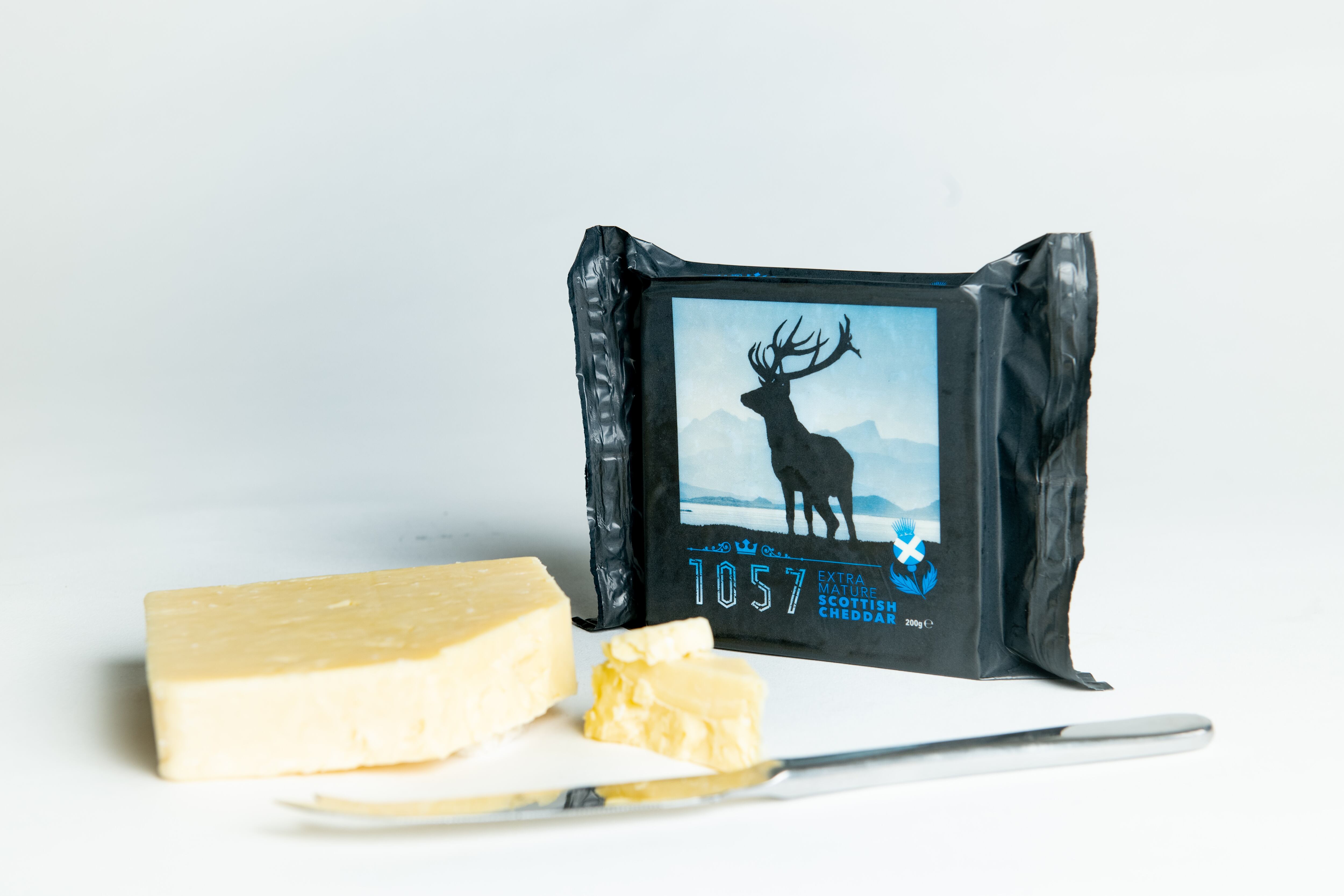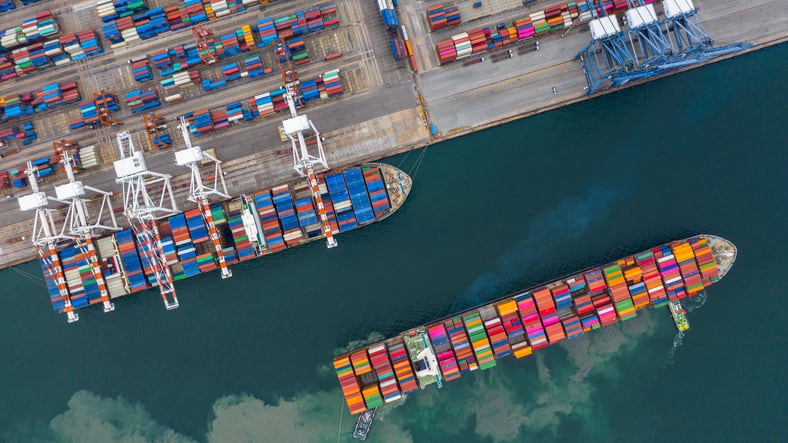Founded in 2019 by former Ornua employees Kevin Beer and David Evans, Millbrook Dairy specializes in bulk and packaged cheese and butter exports to Western Europe, the Middle East, the Far East and North America. More recently, the company introduced a branded cheddar product 1057 Scottish Extra Mature Cheddar and Irish cheddar, Seanachai.
Despite having to navigate major trade barriers, the company grew its overseas sales by 109% in three years and secured the coveted King’s Award for Enterprise in International Trade in 2024.
“Overnight, we had the situation with [France] president Macron putting down COVID lockdown on trucks going into France,” Beer told us. And at the end of the Brexit transition period on December 31, 2020, there was more tumult. “All of a sudden, the EU health codes on products had to change,” Beer said. “We had a lot of product waiting to go that couldn’t go over that Christmas period – we had a few sleepless nights that Christmas.”
“You’re not just thinking about the stock – you’re thinking about your working capital, you’ve got terms ticking away… If you can’t sell the cheese, you can’t raise invoices for it if it’s not delivered. You’ve got trucks sat there, you’ve got storage prices, costs going up. So we had to become very efficient, very quickly at export – and we did.”
Brexit’s trade impact in a nutshell
When the UK stopped being an EU member in 2020, a transition period commenced until 31 December 2020, during which trade and regulatory arrangements between the UK and the bloc continued to apply on a ‘business as usual’ basis.
The transition period ended on January 1, 2021 and under the new regime, trade remained tariff- and quota-free – but there were non-tariff barriers, such as Rules of Origin requirements; and new customs, border and immigration rules (some of those gradually phased-in).
He added that the company ‘had to take a few knock-backs’ in the early days of Brexit. “I think everyone who was involved in export felt the same,” Beer told us. “There was a sudden introduction of non-tariff barriers, including a new health certification and veterinary checks and all sorts of things. Plus, the interpretation of rules by some national authorities changed overnight, which caught us out.
“Nothing changed on paper, but the way the rules were applied changed without warning. We had to evolve very quickly, learn very quickly.” And what about now? “We keep on top of what the Provision Trade Federation advise. We’re in touch with our freight forwarders. We just stick to rules and make sure everything is done correctly.”
There’s no space for complacency, however – particularly if a business is new on the block. “If you’ve made an error in your paperwork, or there’s something in there that’s in the wrong classification or isn’t allowed, you potentially could lose a truckload of product, which could wipe you out if you’ve just started,” Beer said.
Tariff impacts ‘can be negated’
Besides Western Europe, Millbrook Dairy exports to the Middle East and the Far East, with some own-label label and branded product going also to North America. “In North America, it’s private label and some branded product; in the Middle East, we do bulk, and Australia is branded product again and some private label. And then in the Far East, we’re seeing a lot of interest in cheddar and mozzarella.”
Sourcing cheese is where the company’s expertise lies in. “If a customer wants Irish cheddar from a particular factory of a certain age profile, we make sure that we’ve got that in stock and get it formatted and delivered to them for their customers,” Beer explained. “Our 1057 cheddar is in Canada, the US and Australia. We also supply specialist cheddar and all sorts of things from own label to bulk, but we can be very bespoke, too.”
France’s pandemic-hit exports
In 2020, France’s exports were more adversely affected by the public health crisis than those of Germany, Italy, Spain. This is linked to the stricter lockdown measures imposed by the French in Spring 2020.
In Q2 2020, French goods exports fell by around 34% in value terms compared to Q4 2019 (Germany: –25%; Italy: –28%; Spain: –28%).
In Q4 2020, the value of French goods exports remained 10% lower year over year, whereas it had almost returned to pre‑crisis levels in Germany, Italy and Spain.
Source: Banque de France
In comparison to other markets, the firm’s North American business is ‘very small’. “It gives us a good visibility of the global landscape and what’s going on, and it’s just another string to our bow.”
US tariffs aren’t a major worry, then? “Because it’s fine food at the higher end of the market, and the portion size is quite small and a lot of the cost-margin distribution costs sit on the US side, the actual import invoice value is quite small,” Beer explained. “So the difference that the current tariffs make on taking cheese to the USA, we haven’t really felt it. And to be honest, that additional tariff cost can be negated or doubled quite easily by currency moves, or the cost of dairy can change so dramatically.”
More FTAs, please
Asked if there are any particular barriers to trade he’d like to see lifted, Beer told us: “All trade barriers – you shouldn’t have trade barriers at all. You’ve got to have paperwork and all that, but we should have free movement of goods.

“And within the EU and the UK, I just don’t see the point, really, in what we’re doing. That’s not an anti-Brexit comment - it’s just a commercial one. And the more free trade agreements we’ve got, the better.”
Reciprocal tariffs ‘could drive business’ from EU, UK to Asia
So what’s driving demand for British cheese and butter abroad? Millbrook Dairy co-founder Kevin Beer was part of the AHDB cohort at FHA-Food & Beverage Singapore in April and claims APAC – particularly Singapore, Malaysia, Thailand, Indonesia, Hong Kong and China – represents a ‘massive opportunity’. “All these places are keen to have good products. And especially with what’s going on in the US and tariffs, it does make European and UK products more interesting for them.”
“British product is seen as superior – there are certain kudos associated with it. But there’s not, generally, a huge amount of knowledge about British cheese, outside of the high-end restaurants and some supermarkets.”
The main opportunity in Far East would be with bulk product, he explained. “The general volume would be more mozzarella and curd, mild cheddar for foodservice and manufacturing. There’s a big opportunity for that there – but at the minute, we’re competing with the US. So any reciprocal tariffs could make a big difference. That could drive business from Europe and the UK into the Far East.”
Singapore-bound
In 2023, the UK exported 2,763 tons of dairy products to Singapore, valued at £8.1m. This represents a portion of the UK’s total dairy exports to Southeast Asia in the same year, which amounted to 8,830 tons with a value of £24m.
Singapore presents an attractive market for UK red meat exporters, with 1,094 tonnes exported to the country in 2023 with a value of £2.3m. The UK exported 19,855 tons of red meat to Southeast Asia (including Singapore) with a value of £36.7m in 2023. Singapore has a high expat population (nearly 30% in 2020), making it a prime opportunity for premium cuts of British beef, pork, and lamb.
Source: AHDB
Global high-end bakery trends drive bulk dairy demand
As for pockets of growth for British dairy exports: on the cheese front, there’s a growing interest in cheddar in the Far East, Beer explained. “This realization that you can get mild cheddar, mature, and extra mature cheddar. People were amazed - they loved it.”
Cheese aside, where does demand for butter come from across the Middle East and Asia? “On the butter front, the obvious one from our point of view is mini portions,” Beer said. “There’s also a rising demand for butter sheets.
“High-end bakery is such a trendy thing across the globe right now. In the Far East, people can’t get enough of giant croissants and cronuts. So there’s a big demand for that – and French butter sheets are really expensive.” Dairy producers the world over are ‘working hard’ to develop butter for bakeries – ‘high-fat, low-moisture butter and cultured butters in different formats’, he added.

And these markets are only set to become more appealing for dairy companies. “You’ve got rising incomes, wealth is moving in that direction,” Beer said. “People’s tastes are changing: the demand is moving upscale, so there’s more interest in what we would perceive as finer products.”
He explained that in the Middle East, Lulu Hypermarkets - one of the largest retail chains in Asia and the biggest in the Middle East – is growing its share of the market and is increasingly looking to source higher-end dairy for its own-label brand.
“We see more demand from that region for consumer products.”
But going forward, butter will come increasingly in focus. “I think butter is key – there’s a lot of opportunities with different butter formats - butter sheets, butter dishes, butter sticks, you name it. In the Far East and the Middle East, there is lots of high-end development in those areas.
“There’s growing middle class across the world with an appetite for premium dairy products, so that represents a substantial growth opportunity.”

